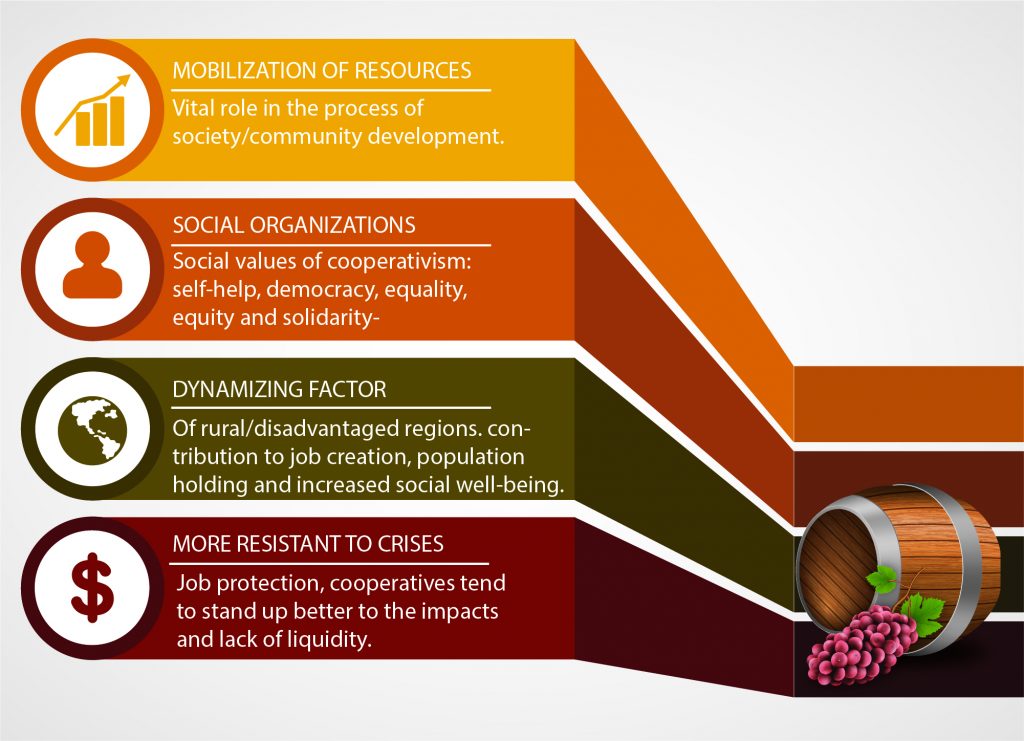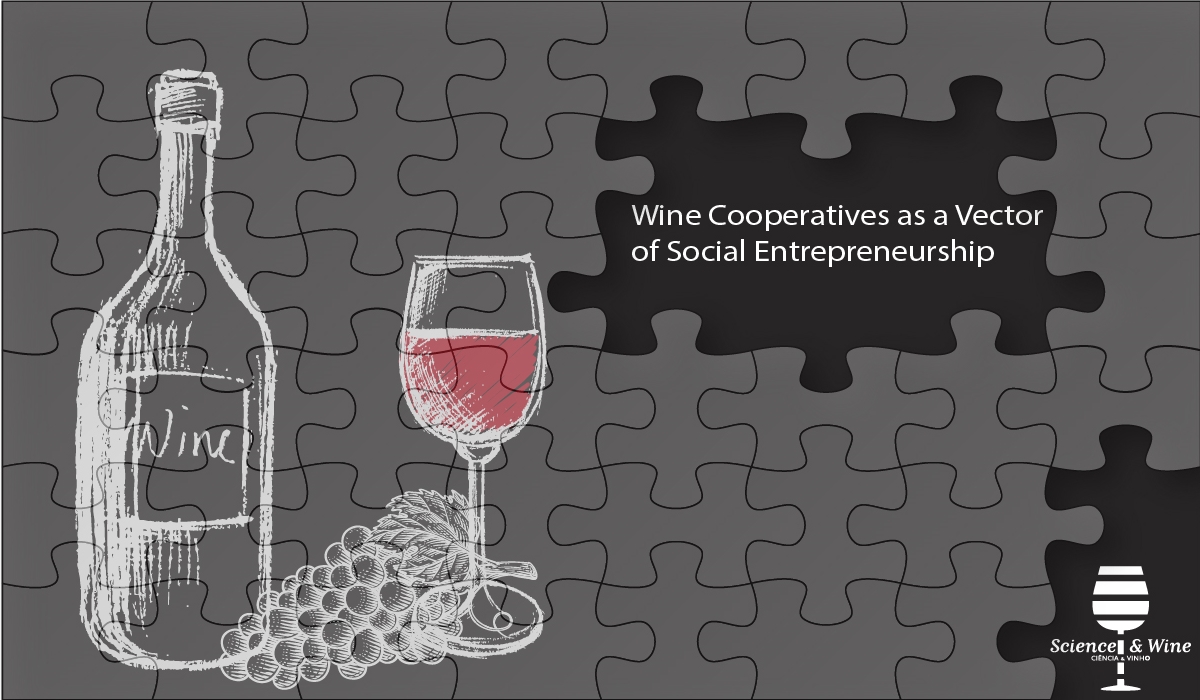By Mário Franco and Vitor Figueiredo
In many European countries and elsewhere in the world there is major renewed interest in cooperatives, as this type of business organisation seems to more resilient (and can achieve better performance than capitalist firms, principally at times of prolonged financial and economic crisis, such as the one experienced recently.
In a global market with constantly evolving technology, only cooperatives with the capacity to exploit new opportunities, allied with correct management of their current resources, can reduce uncertainty and manage change in a balanced and sustainable way. Therefore, the cooperative phenomenon has been studied in various regions of the world and several contexts, for example in wine sector. These agriculture cooperatives have multiple impacts on their members and are considered an organizational format able to promote society’s development. A report asked for by the US Department of Agriculture concluded that a cooperative only reaches success if it provides the necessary and desired services for its members to feel satisfied.
The national and international wine market faces major challenges, either due to political and economic instability, or the great competition and decreasing world consumption of this type of drink. Therefore, wine cooperatives have been seen as representing sustainability in this sector in particular and present a certain impact on the society they are part of. Wine cooperatives seek to provide necessary services to their members and communities, so that they can become more self-sufficient and prepared for times of economic crisis. Cooperatives are more resistant to crises, mainly as regards job protection, as they tend to protect their employees and co-operators, preferring to reduce prices/salaries paid than to dismiss. Moreover, as the policy of distributing surplus is much more rational, cooperatives tend to stand up better to the impacts and lack of liquidity at times of crisis, compared to firms that focus on maximizing profits. In addition, wine cooperatives are considered potential organizational vectors for society’s development due to their multiple objectives and diverse roles.

Despite the difficulties in improving their competitiveness, wine cooperatives are seen as important vehicles for mobilization of local resources into a critical mass and their cooperators can achieve significant economic and social benefits from participation. In this sense, social entrepreneurship plays a vital role in the process of society/community development as well as making a significant contribution to cooperators. Social entrepreneurship can be understood as a way entrepreneurs adjust their businesses to create social value.
The wine cooperatives are economically oriented to be included in the non-profit sector and too socially oriented to be considered as an economic for-profit organization. This type of cooperatives must constantly innovate their ways to obtain income, to ensure their sustainability and viability, principally those whose aim is to fulfil a mission of a social, non-profit-making nature.
Social entrepreneurship is also fundamental when thinking about local development. This entrepreneurial phenomenon has positive impacts on local development through wealth creation, contributing to GDP, employment, social inclusion, reducing poverty and increasing levels of social well-being. This type of organisation creates stronger, more resilient communities that can achieve economic, social and environmental benefits.
In this context, wine cooperatives as form of social organizations are solutions for local development, instruments of cooperation between citizens, local, regional, national and European organisations and representatives, through business organisations and practices. Wine cooperatives are a viable way to build stronger and more sustainable local economies, oriented towards the social utility and the reinvestment of surplus in social purposes. They are nevertheless compelled to pursue economic strategies, without forgetting their mission and the social values of cooperativism: self-help, democracy, equality, equity and solidarity.

On the other hand, wine cooperatives are an important dynamizing factor of rural and disadvantaged regions, given their contribution to job creation, population retention and increased social well-being, as well as contributing to preserving the landscape and natural resources. Being organized into agricultural cooperatives is among the alternative strategies suggested to agrarian families to overcome some challenges, which can also help them solve agriculture-related production problems. Therefore, wine cooperatives play an important role, which is also recognized about wine-producing cooperatives, despite the difficulty and turbulence of this market where competition is fierce.
It is therefore justified to say that wine cooperatives are a way for small farmers to achieve a scale to sell their grapes and weather to some extent the turbulence of the market, avoiding having to close their operations or the need to negotiate on unfavorable terms with large economic groups.
Social entrepreneurship is also fundamental when thinking about local development. This entrepreneurial phenomenon has positive impacts on local development through wealth creation, contributing to GDP, employment, social inclusion, reducing poverty and increasing levels of social well-being. This type of organisation creates stronger, more resilient communities that can achieve economic, social and environmental benefits.
In conclusion, social entrepreneurship emphasizes innovative and social enterprises (i.e. wine cooperatives), with the goal of achieving sustainable development and social missions of common prosperity. In fact, wine cooperatives are good examples of profit-driven businesses working for society/community development and operating in a competitive economic market environment. Thus, managers and cooperators should provide internal transformations in cooperatives, through the implementation of innovative production processes, quality assessment of grapes and wine, cooperative mergers and premium prices paid for high quality grapes.
These agricultural social entrepreneurs (managers and wine cooperators) could be vulnerable to market competition and risk-taking could sometimes lead to personal sacrifice. Thus, they need both institutional and community support during the process of social entrepreneurship development in terms of policy initiatives, resources, financial and even emotional support from other stakeholders. We also observed that the cooperative support given to these social entrepreneurs during difficult times is crucial for their survival.
It is also important to point out that community partnership with external public and private institutions and cooperative unions is a very important element in order to gain capital and investment, capacity building, education and training, and technical, business and financial advice and support. In this sense, social entrepreneurship plays a vital role in the process of society/community development as well as making a significant contribution to wine cooperators.
Those interested in a longer length report can download the working paper at:
https://www.sciencedirect.com/science/article/pii/S026483771830022X

Mário Franco is a Professor of Entrepreneurship and Management of SME at the Department of Management and Economics, University of Beira Interior, Portugal. He received his Ph.D. in Management from Beira Interior University in 2002. In 1997, he was a doctoral candidate and participated in the European Doctoral Programme in Entrepreneurship and Small Business Management in Spain and Sweden. His research focuses on strategic partnerships, business networks, innovation and business creation. He is also a research fellow of the CEFAGE-UBI Research Center and currently involved in several research projects.

Vítor Figueiredo is an enterprise Consultant and Invited Professor of Marketing, E-Business and Web Marketing at the Department of Management and Economics, University of Beira Interior. He received his Ph.D. in Management from Beira Interior University in 2017. He studied Tourism Management and received his MSc in Tourism Management and Development, from the Aveiro University in 2010.

